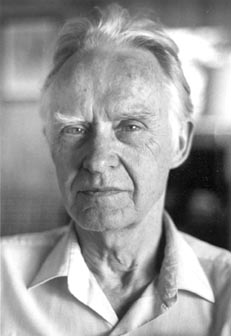|
||||
| WILLIAM PRESSER | |||
|
WILLIAM PRESSER (1916-2004) was born in Saginaw, MI. He received music degrees from Alma College, University of Michigan (M.M. in violin), and the Eastman School of Music (Ph.D. in theory). His teachers included Roy Harris, Gardner Read, Bernard Rogers, Burrill Phillips, and Pierre Monteux. Dr. Presser performed as violinist and violist in the San Francisco Symphony, Rochester Philharmonic, and other orchestras, and taught at colleges in six states, primarily the University of Mississippi in Hattiesburg where he served on the faculty from 1953 until his retirement in 1981. He also taught at the National Music Camp at Interlochen. Presser began composing at age 25 and won many awards, with music in the catalogs of over twenty publishers. His chamber works for winds and brass are staples of the repertoire, appearing on many contest lists and college recitals. William Presser founded Tritone Press & Tenuto Publications in 1961 and over his 41-year tenure built a catalog of over 350 works by over 50 American composers. |
 photo © Arnold Werner |
||
|
There are 128 compositions by William Presser available from TENUTO PUBLICATIONS, in the following categories: | |||
|
Flute & Piccolo Oboe & English Horn Clarinet Saxophone Bassoon Wind Quartet & Quintet Horn Trumpet Trombone Euphonium/Baritone |
Tuba Brass Quintet & Larger Ensembles Percussion Piano Organ Strings Band Orchestra Voice Chorus |
||
WILLIAM PRESSER - EXTENDED BIO |
|||
William Henry Presser was born April 19, 1916 in Saginaw, MI to parents who discouraged him from pursuing the career he loved. His mother, Alma Presser, hoped he would work in a grocery store or perhaps become a trumpet virtuoso. His father, Charles Presser, was a saw blade manufacturer. Charles had some musical ability, as he played guitar by ear. However, in young William’s background, the strongest vein of musical talent came from his great-uncle the music publisher, Theodore Presser. Unfortunately, Theodore Presser died when William was 9, and they never had the opportunity to meet. William Presser’s earliest exposure to his favorite instrument came when a salesman sold the family a violin and lessons. His mother preferred the trumpet and was disappointed that her son insisted on the violin. The few rudimentary lessons did not last long. William did not receive serious violin lessons until high school when he was able to earn money and pay for them himself. After finishing Saginaw public schools, he attended Saginaw Freshman College, then finished his Bachelor of Arts in 1938 at Alma College, Michigan. Next he went to the University of Michigan. There he began studying composition and conducting while majoring in violin under a Russian instructor. He studied under conductors Thor Johnson, Herman Genhart, Guy Fraser Harrison, and Pierre Monteux. Percival Price taught him composition. He graduated in 1940 with a Master of Music in violin. He taught briefly at Buena Vista College in Iowa then entered Eastman School of Music in the summer of 1942. His studies were interrupted when he was drafted into the Army in 1943 where he served in the Military Police. After his brief military career, he returned to Eastman and also began playing with the Rochester Philharmonic. During his two-year tenure at the Philharmonic, he played 2nd Violin and Viola. There were many guest conductors including Fritz Reiner, Dimitri Mitropoulos, Sir Thomas Beecham, Artur Rodzinski, André Kostelanetz, Leonard Bernstein, and Igor Stravinsky. In 1947, William Presser graduated with a Ph.D. in Theory. He resumed his teaching career at Florida State College for Women where he taught violin and conducted the orchestra. There he met Vera Geraldine Farnsworth, a music education major and bassoonist. Dr. Presser moved on to Florence State Teacher’s College (now North Alabama University), but corresponded with his former student. They were married December 25, 1950. After briefly serving as head of the music department of West Texas University, William Presser and his wife moved to San Francisco where he taught in a small school and worked as a free-lance violist. In 1953 he entered the faculty of Mississippi Southern College (now the University of Southern Mississippi.) He taught music theory and orchestration until his retirement in 1981. In addition, he conducted the university orchestra for seven years of his tenure at USM. William Presser’s long career also included being resident composer at Appalachian State University, and guest composer at Indiana University, Winona State University, and Tufts University. He taught at the National Music Camp in Interlochen, Michigan where he, his wife, and their two children had a summer home. Presser began composing in 1939 while at the University of Michigan. As well as by Percival Price, he was mentored by Gardner Read, Bernard Rogers, Burrill Phillips, and Roy Harris. He was most influenced by the musical style of Harris, including his ideas of resonance, dissonance, and harmonic series. Of the numerous awards and grants he received, there were eleven first place awards in unrestricted national contests for composition. He received annual awards every year beginning in 1966 from ASCAP for his contributions to serious music. He had 130 published works, mostly for the instrumental medium. His chamber music for winds and brass are staples of the repertoire, appearing on many contest lists and college recitals. To promote American composers, William Presser founded Tritone Press & Tenuto Publications in 1961. During his 41-year tenure he built a catalog of over 350 works by more than 50 American composers. William Henry Presser died at the age of 88 in August 2004. He said before his death, “I really think I’ve written all I’m supposed to.”
Many thanks to the composer's daughter Susan Presser Galligan for preparing this bio, and to Dr. Kimberly Davis for permission to use extracts of her dissertation. = = = = The text of this website is available for modification and reuse under the terms of the Creative Commons Attribution-Sharealike 3.0 Unported License and the GNU Free Documentation License | |||
|
|
|||
